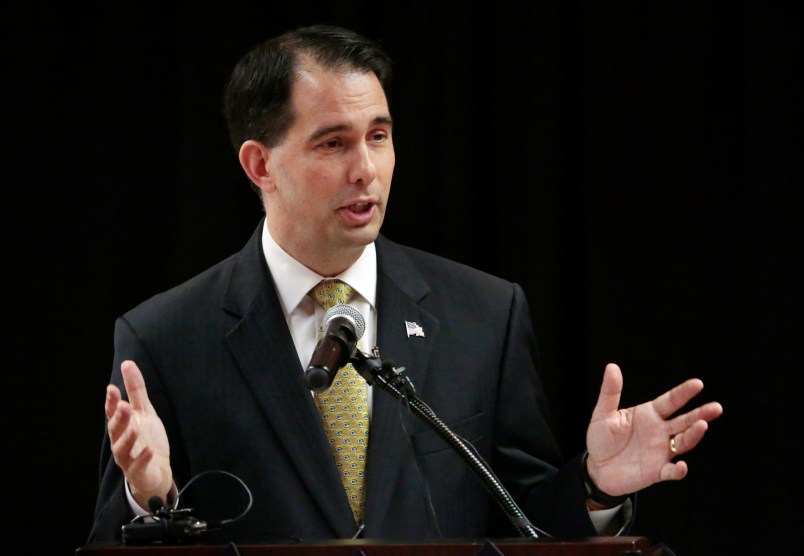As Republican lawmakers in Wisconsin move forward Tuesday with plans to rush votes on bills to lock in their power during the lame duck session, outgoing Gov. Scott Walker is affirming he’s on board.
“For all the talk about reining in power, it really doesn’t,” Walker told reporters about Democrats’ complaints on Monday evening, according to the Milwaukee Journal-Sentinel.
The Republican governor signaled that he is willing to sign off on the wide-ranging package of bills before he leaves office Jan. 7.
Protests roiled the Capitol in Madison on Monday, as Wisconsin voters came out to express their opposition to the proposals. The Journal-Sentinel reported that after some 10 hours of testimony and debate, the Joint Finance Committee approved three bills that would transfer key powers from Democratic Gov.-elect Tony Evers and Democratic incoming Attorney General Josh Kaul to the GOP-controlled legislature.
Notably, the committee did not take up a proposal to move the date of the 2020 presidential primary in an involved maneuver intended to facilitate the reelection of a sitting Republican Supreme Court justice. Separating these two contests into two separate elections would cost Wisconsin taxpayers an estimated $7 million.
But the legislature is still planning to vote on a spate of controversial measures. Some would allow the legislature to substitute the attorney general with taxpayer-funded, hand-picked private attorneys when their laws are challenged in court; pack state boards with GOP-picked members; and curtail Evers’ ability to implement state laws.
Evers and Democratic-aligned groups have threatened to sue over some of these proposals, particularly one that would limit early voting to two weeks. A similar limit was found unconstitutional in 2016.
Tuesday is a pivotal day, with the Senate planning to take up the lame-duck bills on the floor in the morning. As the Journal-Sentinel reported, Republicans can only afford to lose one vote in the chamber, where they have an 18-15 majority. So even as the measures appear to be on a fast track towards Walker’s desk, their final fate is not yet clear.
Republicans in neighboring Michigan are taking similarly drastic steps to hold onto their power before January, when a Democratic governor, attorney general and secretary of state will assume office.











Not chastened by defeat, Walker remains as loathsome as ever.
Republicans can only win if they cheat.
No surprise at all … it’s right there in the playbook:
“Will the last Republican out the door please disable the alarms, remove the fire extinguishers, arm the booby traps and detonate the IED’s?”
If this isn’t a coup, I’m not sure what is.
One word - Shameless